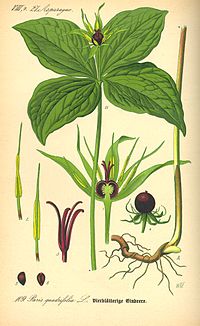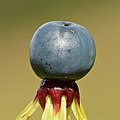| Paris quadrifolia | |
|---|---|

| |
| Specimen near Mont-Saint-Père, France | |
| Scientific classification | |
| Kingdom: | Plantae |
| Clade: | Tracheophytes |
| Clade: | Angiosperms |
| Clade: | Monocots |
| Order: | Liliales |
| Family: | Melanthiaceae |
| Genus: | Paris |
| Species: | P. quadrifolia |
| Binomial name | |
| Paris quadrifolia L. | |
| Synonyms | |
| |


Paris quadrifolia, the herb Paris or true lover's knot, is a species of flowering plant in the family Melanthiaceae. It occurs in temperate and cool areas throughout Eurasia, from Spain to Yakutia, and from Iceland to Mongolia. It prefers calcareous soils and lives in damp and shady places, especially old established woods and stream banks.
P. quadrifolia is in decline in Europe due to loss of habitat. In Iceland, for example, it is on the red list.
Characteristics
P. quadrifolia is a perennial herbaceous plant that is 25 to 40 cm (10 to 15.5 in) tall. It may have 3–8 leaves but typically there are four leaves arranged as opposing pairs. The flowers are wispy and inconspicuous.
The plant flowers during the months of June and July. It has a solitary flower with four narrow greenish filiform (threadlike) petals, four green petaloid sepals, eight golden yellow stamens, and a round purple to red ovary. The flower is borne above a single whorl of four leaves.
Each plant produces at most one blueberry-like berry, which is poisonous, as are other plant tissues. Poisonings are rare because the plant's solitary berry has a repulsive taste that makes it difficult to mistake for a bilberry.
Gallery
-
 Herb Paris with Fruit
Herb Paris with Fruit
-
 Typical Herb Paris woodland habitat in Ayrshire, Scotland.
Typical Herb Paris woodland habitat in Ayrshire, Scotland.
-
 Fruit
Fruit
-
Details of the leaves.
-
Typical limestone (cornstone) based woodlands rich in Herb Paris colonies.
References
- ^ ‹ The template below (WCSP) is being considered for deletion. See templates for discussion to help reach a consensus. ›
"Paris quadrifolia". World Checklist of Selected Plant Families (WCSP). Royal Botanic Gardens, Kew.
- Prof. Dr. Otto Wilhelm Thomé Flora von Deutschland, Österreich und der Schweiz 1885, Gera, Germany
- BSBI List 2007 (xls). Botanical Society of Britain and Ireland. Archived from the original (xls) on 2015-06-26. Retrieved 2014-10-17.
- ^ "Paris quadrifolia". Plants of the World Online. Retrieved 21 October 2019.
- "Red List for Vascular Plants". Icelandic Institute Of Natural History. Retrieved 21 October 2019.
- "Paris quadrifolia". Flora of China. Vol. 24 – via eFloras.org, Missouri Botanical Garden, St. Louis, MO & Harvard University Herbaria, Cambridge, MA.
- Altervista Flora Italiana, Uva di volpe Paris quadrifolia L.
- Jacquemyn, Hans; Brys, Rein; Hutchings, Michael J. (July 2008), "Biological Flora of the British Isles: Paris quadrifolia L.", Journal of Ecology, 96 (4): 833–844, Bibcode:2008JEcol..96..833J, doi:10.1111/j.1365-2745.2008.01397.x
External links
| Taxon identifiers | |
|---|---|
| Paris quadrifolia |
|
This Liliales article is a stub. You can help Misplaced Pages by expanding it. |